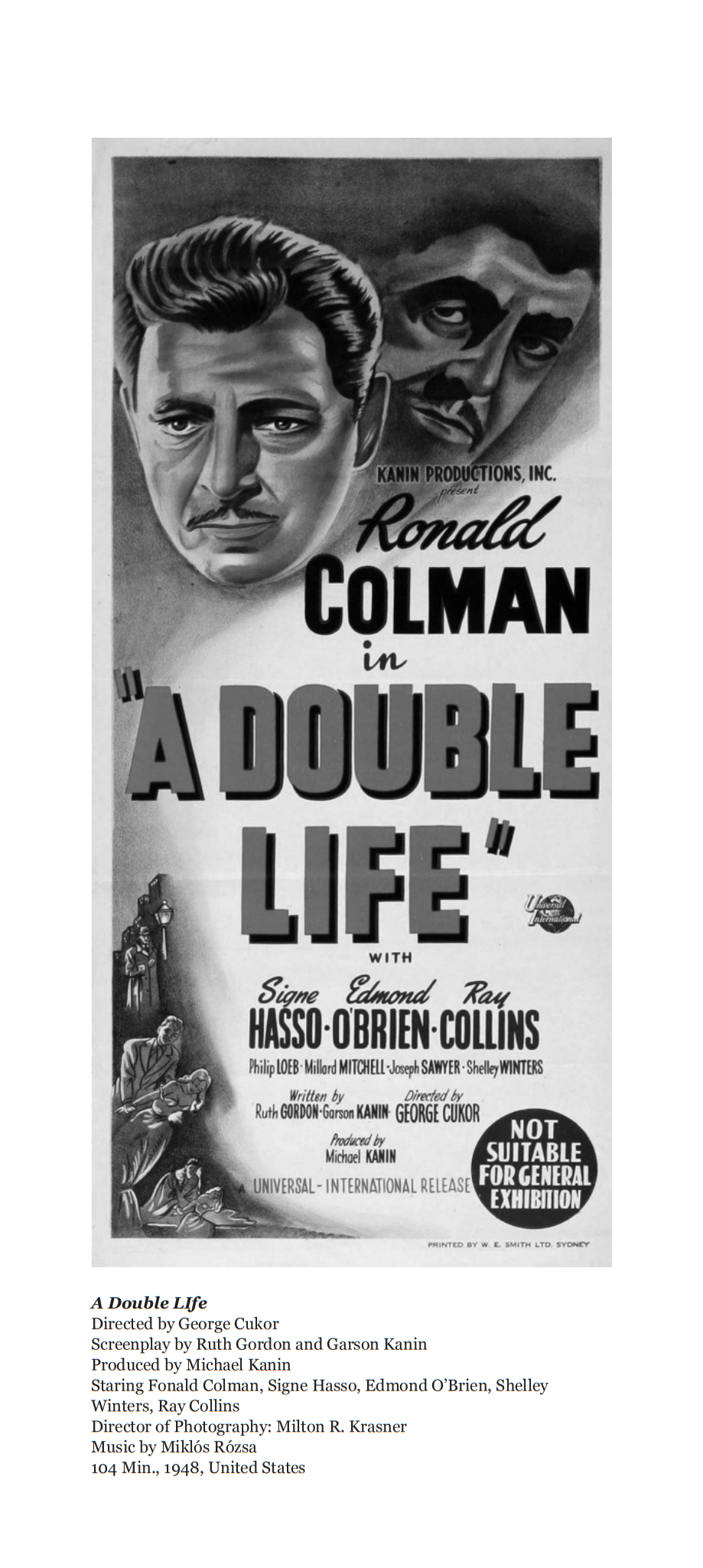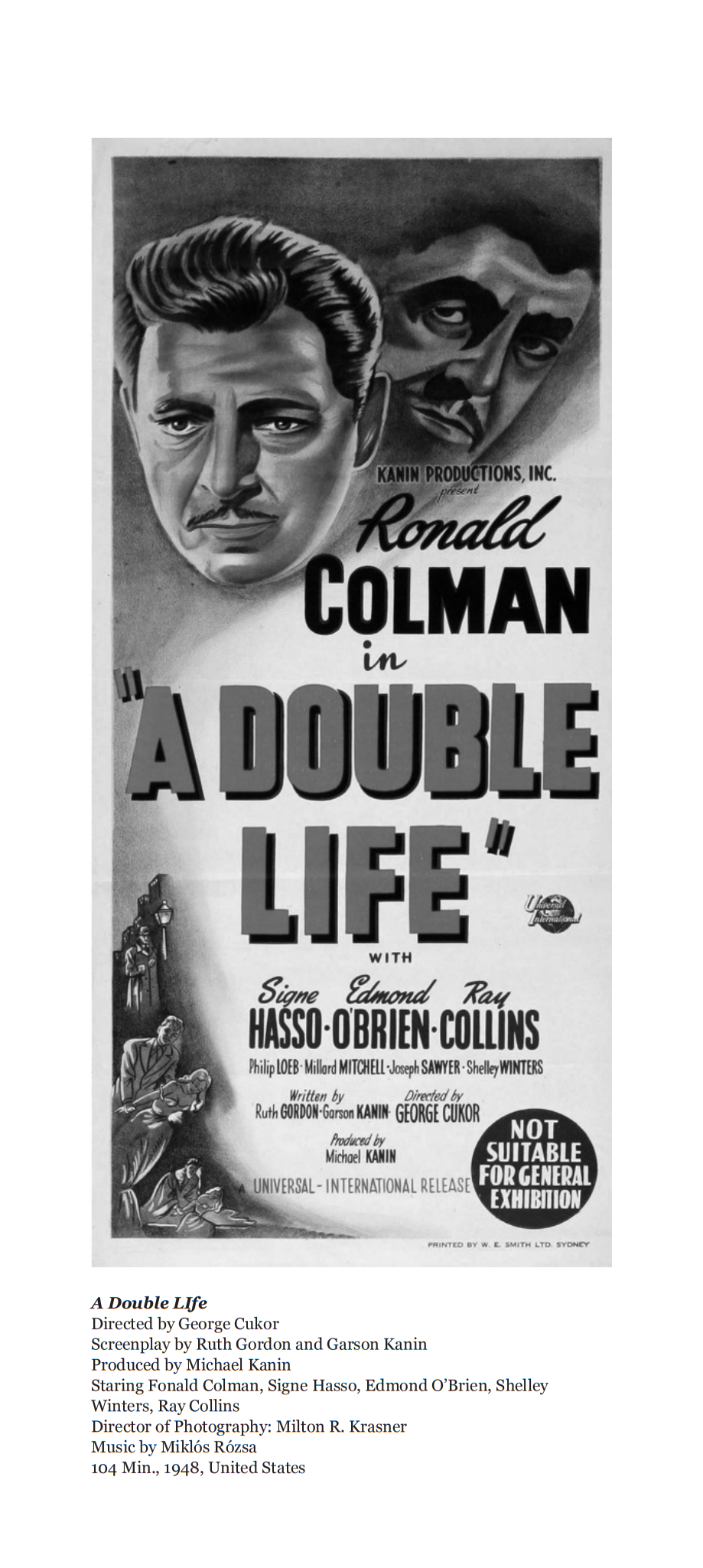Film Review: A Double Life
by Vic Neptune
British actor Ronald Colman stars in A Double Life (1947), directed by George Cukor. Colman plays celebrated stage actor Anthony John, who has reached an impasse in his career just as he’s run into a stall with his ex-wife Brita (Signe Hasso)--they’re friends post-divorce but he’d like to get back together again despite her budding romance with press agent Bill Friend (Edmond O’Brien).
Anthony is ofered a chance to enliven his stale career by playing the titular role in a revival of William Shakespeare’s Othello, his ex-wife to play Othello’s doomed wife, Desdemona. Though reluctant, he takes on the challenge almost as if it’s an inevitability he can’t avoid, mirroring Othello’s own magnetic pull toward his own wretched fate when, egged on by the villain Iago, he strangles Desdemona, believing her to be unfaithful.
Anthony John’s doom is to be so successful playing Othello during a year’s worth of sold out performances that he’s driven mad, his own personality melding with that of his stage role. His jealousy, like Othello’s, leads him to maltreat Brita on stage, in one performance coming close to actually strangling her, creating an ultra-real effect for the unknowing audience to witness.
Much earlier, after the first well-received performance, he shies away from attending the after-party, wandering contentedly about New York, entering an Italian restaurant for a late dinner. The place, called Venezia (Venice), reflects the main location where Othello takes place. Anthony’s polite absent-minded charm attracts his waitress, Pat (Shelley Winters), an easy-going and lonely young woman. He ends up at her place that night but doesn’t see her again for several months. Deep into his growing madness, he knocks on her door, waking her up, surprising her. She invites him in, annoyed at first due to his long absence, but she soon lightens up, makes coffee, and chatters away even as he smolders inside Othello’s lines. He attacks her as if she’s Desdemona. The next day he doesn’t remember killing her, but Brita still feels the sting of his jealous ravings about her relationship with Bill.
To be convincing at depicting a literary character’s rage possessing an actor must have been difficult for both Ronald Colman and his director, George Cukor. Still, Cukor’s direction showing the monotony Anthony faces in having to perform Othello night after night for a whole year, given the actor’s unbalanced brain chemistry, his susceptibility to mood swings, lays the groundwork for a realistic psychotic break. This man acts out his real life jealousy and his frustrations with the conditions of his art, in which success on stage equals repetition feeding compulsion.
In one scene Anthony walks a night street intoning, “Bill-Rita-Bill-Rita-Bill-Rita...” It would be funny if it weren’t so pathetic. Othello’s rage, jealousy, suspicion, fueled by the malice of Iago, manifests in Anthony’s psyche as an inner Iago, undermining everything good about the man, for he is likeable at times. In the first scene, a series of greetings to the passing Anthony John followed by gossip reveals a fifty-fifty split: people either like him or they can’t stand him. The darker spaces inside Anthony reflected in these early viewpoints get played for laughs by Cukor, but this director is too great an artist himself to put anything in his films unless they connect with the whole, for our protagonist from the start of the film is a double within one man.
Bill Friend proves to be Anthony John’s undoing, in terms of determining, with the help of a homicide detective, what happened to Pat the waitress. Bill hires a blonde aspiring actress to get made up like Shelley Winters’ character, with the same earrings and hairstyle. As this woman waits on Bill and Anthony’s table, Anthony feels to his core what he did to Pat and rushes out of Venezia restaurant. This bit of stagecraft, though not entirely convincing to the detective watching nearby, leads to the final, when a visibly shaken and spiritually destroyed Anthony plays his last Othello. He forgets many of his lines, barely makes it through to the end, collapses backstage.
Unstuck finally from the role’s artifice, he faces what he’s done, dying, reconciled to Bill and Rita’s union.
This film would not have worked with a lesser actor than Ronald Colman in the lead role. How does one convincingly portray a man in modern (1947) New York losing the best of his personality to the worst of a fictional seventeenth-century personality? Yet, I’m reminded of Heath Ledger’s portrayal of the Joker in The Dark Knight (2008). Reportedly, Ledger wrapped himself into his villainous--and insane--role to such an extent it had an unhealthy effect on his life, leading to his death five months before the film’s release. Because numerous actors have played Othello without going crazy, we can assume it’s not the role, but the man playing it. In the case of Anthony John, the combination of the play’s success, with repeated performances, along with Shakespeare’s potent jealousy theme, leads him to a fatal idée fixe, with the role of Othello the perfect vehicle for carrying out his doom.
For his astounding performance in A Double Life, just as with Heath Ledger six decades later, Ronald Colman won an Academy Award.





